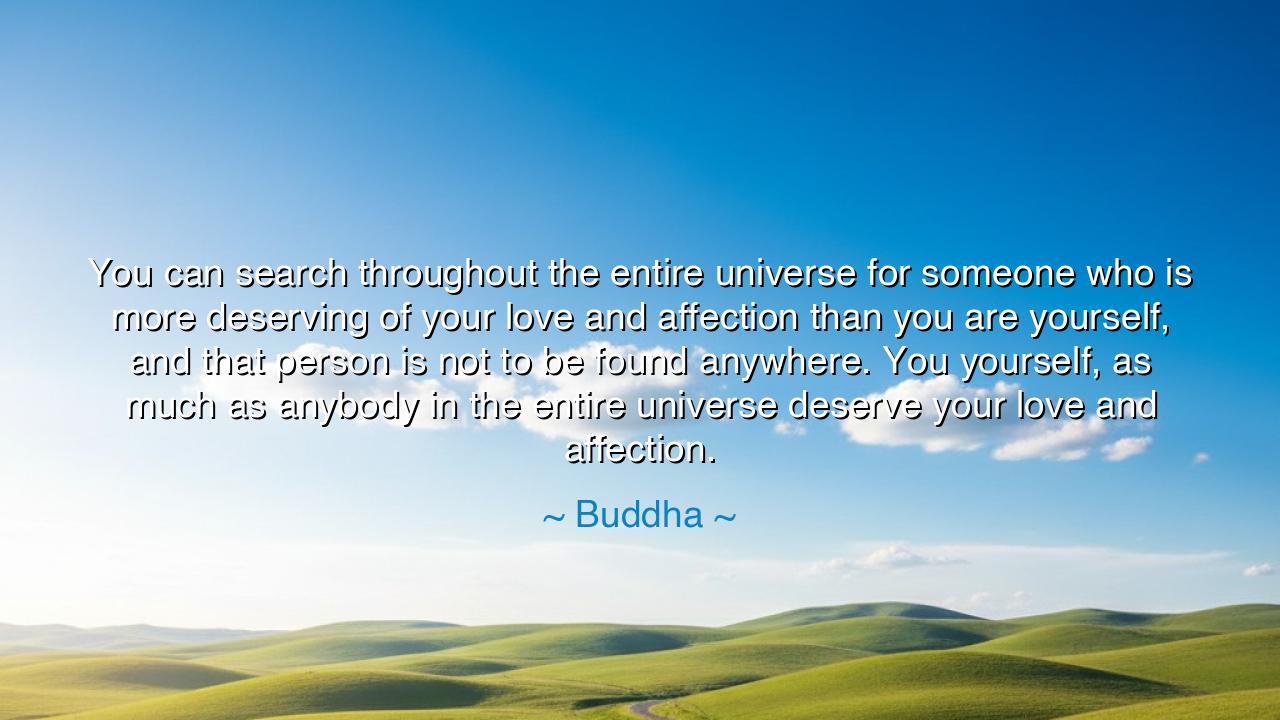
You can search throughout the entire universe for someone who is
You can search throughout the entire universe for someone who is more deserving of your love and affection than you are yourself, and that person is not to be found anywhere. You yourself, as much as anybody in the entire universe deserve your love and affection.






Long ago, beneath the shade of the Bodhi tree, the Buddha looked into the depths of existence and saw not merely the suffering of humankind, but the blindness that feeds it — the forgetting of one’s own worth. From that vision came this radiant truth: “You can search throughout the entire universe for someone who is more deserving of your love and affection than you are yourself, and that person is not to be found anywhere. You yourself, as much as anybody in the entire universe, deserve your love and affection.” These words are not the echo of pride or vanity; they are the song of compassion, directed inward, toward the soul that has long been neglected. For how can one give love to others if one’s own vessel is empty? How can one offer peace to the world if one is at war with oneself?
To love oneself is not to glorify the ego, but to honor the divine spark that breathes within every being. The Buddha’s teaching reminds us that the journey toward enlightenment begins not with conquest of others, but with the gentle embrace of one’s own heart. Too often, humans seek love as beggars seek bread — wandering from soul to soul, hoping to be filled by what can only be found within. Yet the Buddha saw through the illusion: all the affection of the universe cannot replace the peace of self-acceptance. When you cease to search outward and turn inward with kindness, you discover that the heart, once wounded, holds infinite power to heal itself.
Consider the story of the monk Angulimala, who once roamed the forests of India as a murderer, lost in the blindness of rage. When he met the Buddha, he raised his blade — yet the Teacher did not flee. With calm eyes, he said, “I have stopped, Angulimala. It is you who have not stopped.” Those words pierced deeper than any weapon. Angulimala fell to his knees and wept, realizing that all his violence had been against himself. Through compassion — not punishment — the Buddha led him to redemption. That is the power of self-love in its purest form: it does not excuse wrongdoing, but transforms the soul through understanding. It teaches that no one, not even the lost, is unworthy of mercy — especially from themselves.
In the ancient world and in ours, many have carried unseen wounds — warriors, mothers, poets, the lonely and the broken. They bear guilt, shame, and sorrow as chains, believing that they must earn the right to love themselves. But the Buddha’s wisdom burns through this darkness. He tells us that self-love is not earned — it is remembered. It is the original state of being, buried beneath fear and self-doubt. When you treat yourself with gentleness, you awaken the same light that shines in all living things. To love yourself is to honor life itself.
Let this be understood: self-compassion is not selfishness. The one who forgives their own flaws becomes more capable of forgiving others. The one who tends to their inner wounds becomes a healer of the world. The one who honors their own soul sees the sacredness in every face. The Buddha’s teaching is not a call to isolation but to balance — to love yourself and all beings equally, for both are reflections of the same truth. As the lotus blooms unstained from the mud, so too can a heart bloom from suffering into serenity through self-love.
History has echoed this teaching again and again. The poet Maya Angelou, after years of hardship, once said, “I must undertake to love myself and to respect myself as though my very life depends upon self-love and self-respect.” In doing so, she turned her pain into poetry and her struggles into strength. Like the Buddha, she discovered that to embrace oneself fully is to unlock a wellspring of compassion for the world. For when you love yourself rightly, you become incapable of cruelty — toward others or toward your own heart.
And so, dear one, the lesson is eternal: treat yourself as sacred ground. When you fall, forgive. When you doubt, speak kindly to your soul. When you are weary, rest without shame. Practice the art of self-love not through indulgence, but through mindfulness — through simple acts of care, through gratitude for your own breath, through the courage to say, “I am enough.” You will find that when you love yourself as the Buddha taught, the world softens. The noise of judgment fades. The universe, vast and mysterious, ceases to feel cold — because within you burns the flame of affection that no darkness can extinguish.
Remember always: you yourself, as much as anybody in the entire universe, deserve your love and affection. And when you live by that truth, your presence becomes a light for others — proof that peace begins not in the heavens, but in the quiet reverence of one’s own heart.






AAdministratorAdministrator
Welcome, honored guests. Please leave a comment, we will respond soon